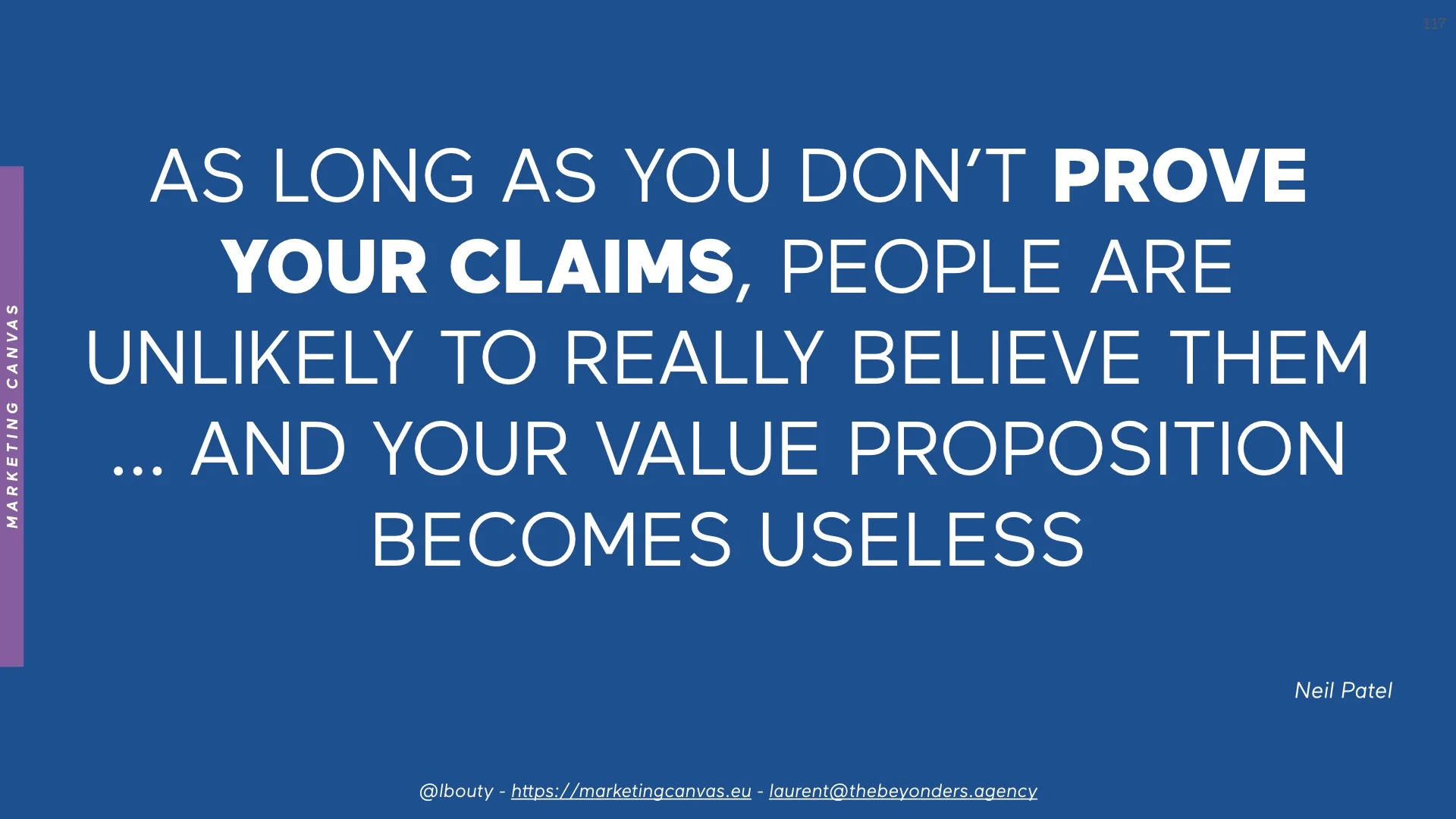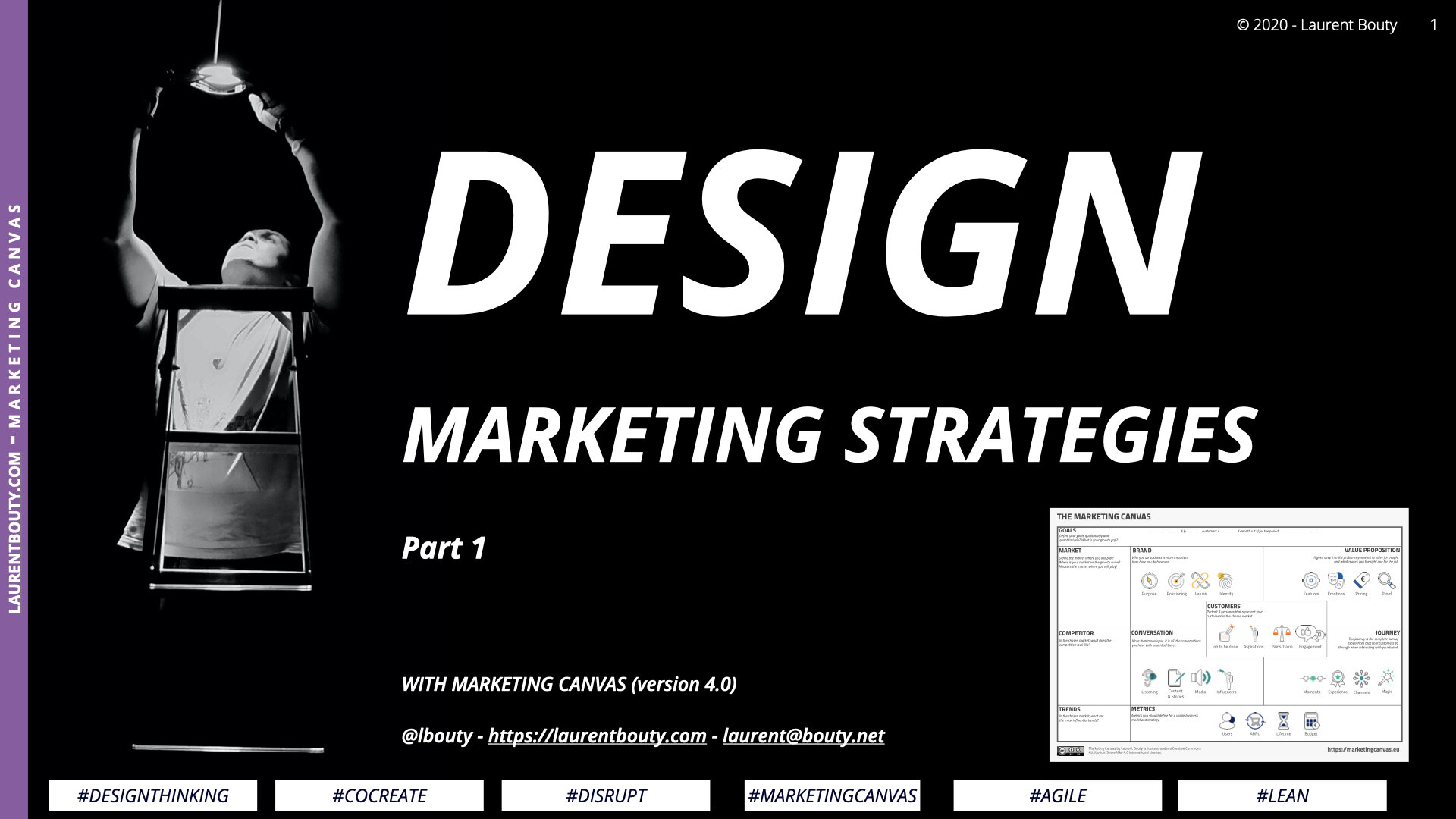Last update: 8/6/2023
In a nutshell
In this comprehensive guide, we explore the concept of "proofs" in marketing - the crucial elements that make your value proposition compelling and credible. We delve into various types of proofs such as studies, expert recognition, social proof, and certifications, demonstrating how each contributes to a solid marketing strategy. To illustrate this concept, we look at a real-world example of a company that successfully utilized proofs. The guide also includes a unique framework for evaluating and improving your proofs, helping you fine-tune your marketing strategy. Whether you're a seasoned marketer or an entrepreneur starting your marketing journey, this guide provides practical insights that can enhance your marketing effectiveness.
In the Marketing Canvas
The Marketing Canvas is a powerful tool for entrepreneurs and non-marketers to build a robust marketing strategy. It consists of six meta-dimensions, each with four sub-dimensions, for a total of 24 sub-dimensions defining your Marketing Strategy. One of these sub-dimensions is PROOFS, which falls under the VALUE PROPOSITION meta-category
Defining proofs?
Proofs play a pivotal role in substantiating your marketing strategy. Imagine proofs as the tangible evidence that demonstrate your value proposition – the compelling reasons why consumers should choose your products or services over others. As Harvard Business School professor Theodore Levitt once stated, "People don't want to buy a quarter-inch drill, they want a quarter-inch hole." Consumers are looking for the assurance that your product will solve their problems or fulfill their needs. And it is through strong, convincing proofs that you can offer this assurance. In the absence of proofs, your value proposition risks being just hollow claims that the consumers are quick to dismiss.
To illustrate the importance of proofs, let's consider Neil Patel's definition of a value proposition: “a believable collection of the most persuasive reasons people should notice you and take the action you’re asking for.” However, a crucial part of making your reasons persuasive and your proposition believable lies in the ability to provide proof.
Indeed, every claim you make about your product or service must be substantiated. It is not enough to say, "We have the best…", or "We are the only one that…". Without evidence or validation, such statements can be perceived as vague, unconvincing, or worse, as plain marketing spiel that consumers are likely to be skeptical of.
Laurent Bouty - Marketing Canvas Method - Proofs
Proving your claims can be accomplished in several ways:
Studies: These could be external studies conducted by trusted sources that verify your claims. For instance, if you claim to have the most reliable network in the UK, it would help to cite a study or survey that confirms this.
Expert recognition: This refers to endorsements by recognized experts in the relevant field who not only confirm your claims but also use your products or services.
Social recognition: If a significant number of people or companies within your category are using your product, it lends credibility to your assertions.
Certifications and awards: These accolades offer additional validation of your claims and enhance your credibility.
These methods align with three principles highlighted in Robert Cialdini's influential book, 'Influence: The Psychology of Persuasion': Social Proof, Authority, and Liking.
If your value proposition lacks credible proof, it will be a hindrance rather than an aid in achieving your goals.
Translating Proofs into Action
Proofs aren't static affirmations of your product's value. They are dynamic tools that should be used actively in your marketing strategy. Begin by aligning your proofs with your value proposition, ensuring they directly demonstrate the benefits you promise to deliver. Then, integrate these proofs into your marketing communications - from your website and social media to your product packaging and in-store displays.
Remember, proofs are not one-size-fits-all. Different customer segments may require different types of proofs. Tailor your evidence to meet the expectations and satisfy the needs of your targeted consumers.
Evaluation and Improvement
Evaluating and improving the effectiveness of your proofs is a continuous process. Rate your agreement with the following statements on a scale from -3 (completely disagree) to +3 (completely agree) to gauge your current status:
Your value proposition is presented in an operational context that clearly demonstrates the promised benefits.
You have explained how your value proposition operates and reassured the customer.
Your value proposition is supported by a recognized third party: a celebrity ambassador, a label, or other trusted sources.
Your value proposition refers directly to a widely acknowledged element of your brand's reputation.
Negative scores indicate areas for improvement. How could you better demonstrate your product's benefits? Could a third-party endorsement make your proposition more convincing? Or perhaps leveraging your brand's reputation could enhance your proof?
Green Clean Use Case
Consider a startup company named Green Clean that manufactures environmentally friendly cleaning products. They claim that their products are as effective as traditional cleaners but are safer for the environment and for human health.
To prove this, Green Clean commissions an independent lab to conduct comparative studies and publishes the results on their website. The studies confirm that Green Clean's products perform equally well, if not better, than their traditional counterparts while having a significantly lower environmental impact.
Green Clean also invites a respected environmental scientist to review their products. The expert provides a glowing testimonial, reinforcing the effectiveness and environmental benefits of Green Clean's products.
Moreover, Green Clean applies for and receives certification from an environmental watchdog, providing further proof of their commitment to environmental sustainability. They share customer reviews on their website, showing real-world usage and satisfaction.
Finally, they reference their success in reducing plastic waste by displaying the cumulative amount of plastic saved thanks to their customers choosing their reusable bottles over traditional single-use containers.
Conclusion
The essence of effective marketing lies not in making impressive claims, but in proving them convincingly. Providing proofs for your value proposition cements your credibility, builds trust with your customers, and ultimately, drives action – be it a purchase, a subscription, or a referral.
Remember, the more you prove, the less your customers have to believe on faith alone. In the landscape of modern marketing where skepticism is common, proofs serve as your undeniable evidence of value, setting you apart from competitors and paving the way for your success. As you continue to develop your marketing strategy, keep proofs at the forefront, continuously evaluating and improving them to ensure they remain compelling and relevant to your audience.
Sources
Neil Patel, Dominate your Market, https://neilpatel.com/blog/dominate-your-market/
HubSpot, Principles of Persuasion, https://blog.hubspot.com/sales/cialdini-principles-of-persuasion
More on the Marketing Canvas
Marketing Canvas by Laurent Bouty






































